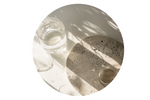Drinking Water Skin Benefits: Does Hydration Really Give You Glowing Skin?

We’ve all heard the beauty advice: “Drink eight glasses of water a day for perfect skin.” It sounds simple. But is there any scientific truth to the claim that hydration directly improves your complexion? Or is it just another wellness myth passed down like an old wives’ tale?
The relationship between water intake and skin health has been studied for decades, and while the answer isn’t entirely black and white, research does suggest that drinking enough water plays an important role in skin hydration and appearance. Let’s break down what the science says, what visible changes you can expect, and how to pair hydration with a smart skincare routine for maximum results.
How Water Impacts Skin Health
Skin is the body’s largest organ, and just like every other organ, it depends on water to function properly. About 64% of your skin is made up of water (Patel et al., 2010). Adequate hydration helps maintain:
-
Skin elasticity and turgor – Hydrated cells plump up, giving the skin a smoother appearance.
-
Barrier function – The stratum corneum (outer skin layer) needs water to maintain a strong lipid barrier that locks in moisture and blocks irritants (Elias, 2005).
-
Nutrient delivery – Hydration supports blood flow, which delivers oxygen and nutrients to skin cells efficiently.
When your body is dehydrated, your skin can lose its natural glow. It may look dull, feel tight, or even flake. In severe cases, dehydration can weaken the skin barrier, making it more prone to sensitivity and inflammation (Proksch et al., 2008).
What the Research Says About Drinking Water for Skin
1. Water Intake Improves Skin Hydration
A landmark study by Palma et al. (2015) investigated whether increased daily water intake could improve skin hydration. The researchers found that participants who consumed an extra 2 liters of water daily for four weeks experienced significantly improved hydration of the stratum corneum. The effect was most pronounced in individuals who had low baseline water intake.
This suggests that if you already drink enough water, adding more might not make a dramatic difference. But if you’re chronically dehydrated, upping your intake could lead to noticeable skin improvements.
2. Hydration and Skin Elasticity
Akdeniz et al. (2018) conducted a systematic review on hydration and skin elasticity. They concluded that increased water intake correlated with improvements in skin elasticity and biomechanical properties. Elasticity is key to youthful-looking skin, as it helps prevent the formation of fine lines and sagging.
3. The Limits of Drinking Water Alone
While water is essential, don’t expect it to erase deep wrinkles or replace your moisturizer. Water hydrates skin cells from within, but without a healthy skin barrier, much of that hydration can escape through trans-epidermal water loss (TEWL). Topical skincare products such as humectants (hyaluronic acid), emollients, and occlusives are necessary to seal in moisture (Proksch et al., 2008).
Signs Your Skin Needs More Hydration
How do you know if your skin is suffering from dehydration? Watch for these signs:
-
Tightness or a “papery” feeling
-
Dull, lackluster complexion
-
Fine “surface” lines, different from deep wrinkles
-
Flaky or rough texture
-
Decreased skin elasticity (pinch the back of your hand—does it snap back quickly?)
If these symptoms sound familiar, increasing your water intake could help, alongside topical hydration.
How Much Water Do You Really Need?
The popular “8x8 rule” (eight 8-ounce glasses per day) equals about 2 liters, which is a reasonable starting point. However, hydration needs vary based on age, weight, activity level, and climate.
A more personalized guideline is to drink about half your body weight in ounces. For example, a 150-pound person should aim for 75 ounces (about 2.2 liters) of water daily.
Keep in mind:
-
Hot climates and exercise increase your needs.
-
High salt, caffeine, or alcohol intake can dehydrate your skin faster.
Tips to Stay Hydrated for Healthy Skin
-
Start your morning with a glass of water – Your body loses water overnight.
-
Eat water-rich foods – Cucumbers, watermelon, strawberries, and celery are high in water content.
-
Keep a reusable water bottle handy – Helps track your intake throughout the day.
-
Pair hydration with a solid skincare routine – Apply moisturizer right after washing to lock in water.
The Bottom Line
Drinking water isn’t a magic solution for flawless skin, but it’s a foundational part of your skincare routine. Adequate hydration supports elasticity, plumpness, and barrier function—giving your complexion a healthy glow from the inside out.
For best results, combine hydration with smart topical skincare. Remember, glowing skin starts both inside and out.
References
-
Akdeniz, M., Tomova-Simitchieva, T., Dobos, G., Blume-Peytavi, U., & Kottner, J. (2018). Effects of water intake on skin hydration and elasticity in healthy adults: A systematic review. Skin Research and Technology, 24(3), 405–412. https://doi.org/10.1111/srt.12463
-
Elias, P. M. (2005). Stratum corneum defensive functions: An integrated view. Journal of Investigative Dermatology, 125(2), 183–200. https://doi.org/10.1111/j.0022-202X.2005.23668.x
-
Palma, L., Marques, L. T., Bujan, J., & Rodrigues, L. M. (2015). Dietary water affects human skin hydration and biomechanics. Clinical, Cosmetic and Investigational Dermatology, 8, 413–421. https://doi.org/10.2147/CCID.S95181
-
Patel, R. M., & Patel, M. J. (2010). A study on water intake and skin hydration. International Journal of Cosmetic Science, 32(6), 425–431. https://doi.org/10.1111/j.1468-2494.2010.00621.x
-
Proksch, E., Brandner, J. M., & Jensen, J. M. (2008). The skin: An indispensable barrier. Experimental Dermatology, 17(12), 1063–1072. https://doi.org/10.1111/j.1600-0625.2008.00786.x


